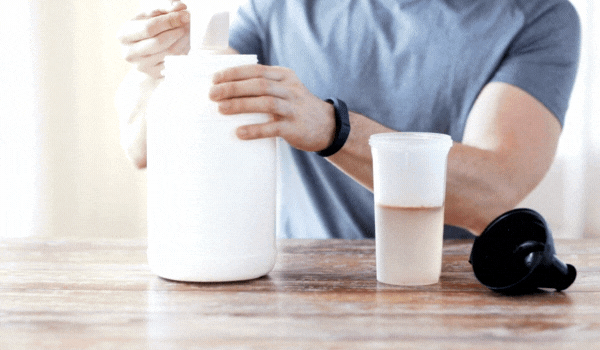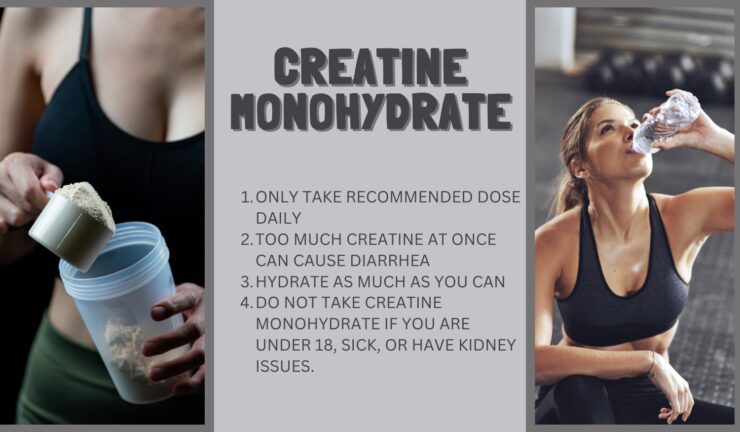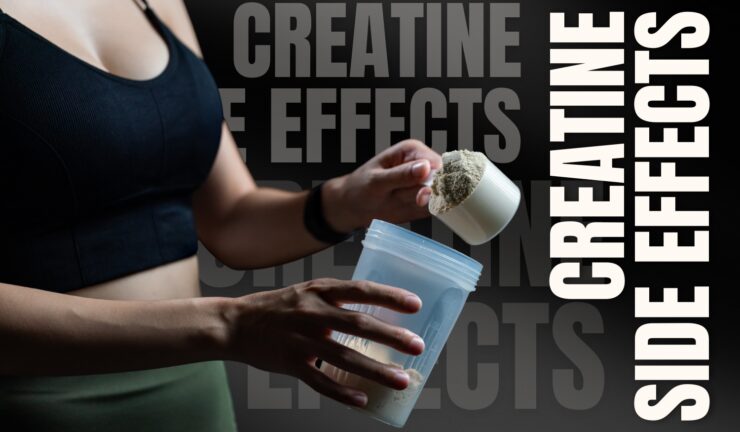Creatine is certainly among the most popular supplements you can opt for when leading a life with a strict diet and high fitness goals. It is commonly used to improve muscle size, strength, power, and performance. For all the good things, it can sometimes have side effects, so today we will answer the question – why do I get diarrhea from creatine monohydrate?
Creatine is not just a supplement; it is an amino acid made in the kidneys, pancreas, and liver, and you can also find it in seafood and red meat. Athletes have used creatine supplements for years to enhance their abilities, but sometimes, they overuse them, and certain side effects occur. In this article, we will go in-depth on this subject and break down why these side effects happen. So, without further ado, let us get into it.
Contents
Creatine Uses
Creatine is used to enhance athletic abilities, improve performance, and stimulate muscle growth. It is found in muscle tissue, and it gets depleted during exercise. Moreover, this supplement helps to produce more energy required for intense workouts, and as such, it is highly popular among athletes that want to take their fitness conditioning to the next level.
The athletes that benefit from creatine mostly are sprinters and weight lifters. However, improving athletic performance is not the only benefit that this supplement brings to the table. It can also aid in preventing and reducing potential injuries and aid in the rehabilitation process.
Amino acids have also been seen to produce positive outcomes in diabetes, adolescent depression, osteoarthritis, pregnancy, aging, fibromyalgia, and neurodegenerative diseases, such as muscular dystrophy, Parkinson’s disease, and Huntington’s disease.
How Safe Is Creatine Consumption?
Extensive studies have not produced any evidence of creatine causing allergic reactions such as rash or creatine hives or any consistent side effects apart from weight loss in some cases. However, some people claim they did experience adverse creatine reactions, but as it turns out, most of them include stomach cramping and diarrhea that occur when high doses are taken.
Studies have also shown that even infants, pregnant women, and older adults show no adverse health risks when dosing with 0.3 to 0.8 grams a day per kg of body weight for up to five years.
However, many experts advise that you should avoid creatine supplementation if you are taking nephrotoxic drugs such as nonsteroidal anti-inflammatory drugs like ibuprofen, naproxen sodium, and cyclosporine.
It is also advised to avoid taking creatine with caffeine or ephedra, as it can lead to an increased risk of stroke or other serious side effects.
Diarrhea and Creatine Monohydrate Connection
As we already mentioned, creatine is not just a supplement, it is present in all human bodies as a combination of amino acids produced by the liver, kidneys, and pancreas. These acids turn into creatine phosphate in your body, which contributes to making a substance called adenosine triphosphate or ATP.
It is important to note that creatine remains in our intestines if it is not properly digested, as it draws water from other areas of our body into muscle tissue. Essentially, creatine keeps drawing water to itself as long as it is present in the body. This influx of water is drawn to our intestines, which creates issues with the normal digestion process, as extra water leads to diarrhea.
How to Prevent Getting Diarrhea From Creatine Monohydrate?
The answer to this is very simple – use creatine supplements in recommended doses. It is recommended to take between three and five grams daily. Consuming more creatine monohydrate will not help you become bigger and stronger and will likely result in digestive problems, cramps, and diarrhea.
Once your ATP pool is full, an excess amount of creatine turns into waste in your body, and as the supplement draws water into your muscle tissue, hydrating properly is an absolute must. If diarrhea keeps troubling you, try consuming it with meals only and see how your body responds. It is also important to use this supplement only if you are healthy and do not have any kidney issues.
Here are some pointers that might help you if you are experiencing diarrhea problems when consuming creatine monohydrate:
- Only take recommended dose daily (3 to 5 grams), and do not overdo it.
- Too much creatine at once can cause diarrhea, so spread your dose over the day.
- Hydrate as much as you can.
- Do not take creatine monohydrate if you are under 18, sick, or have kidney issues.
Potential Creatine Benefits
As far as this supplement goes, studies generally show mixed results. They show that athletes who need a short burst of energy, such as weight lifters and sprinters, benefit from it the most. However, due to inconsistent results in research, it is unknown whether or not creatine is efficient in other sports.
It is also worth mentioning that in rare cases of creatine metabolizing syndrome in children, supplements might improve some symptoms. Some researchers also suggest that topical application of creatine may help some skin conditions. However, since studies on this type of use are limited, it is too early to draw conclusions about its efficiency.
Potential Side Effects of Creatine Monohydrate
When you take creatine for longer periods in recommended doses, it is generally considered safe. However, high doses can damage your kidneys, liver, or even heart. Anyone who has any type of history of kidney disease should avoid this supplement altogether. People with the bipolar disease should also avoid it, as it can increase mania.
Another thing that is important to point out is that creatine causes muscles to retain higher amounts of water, so taking this supplement can result in weight gain. Other side effects of long-term use include nausea, diarrhea, muscle cramps, seizures, and dehydration.
Due to the fact that doctors are unsure about the long-term health risks of creatine consumption, especially for growing children, it is not recommended for anyone that is younger than 18 years of age. Pregnant women also should avoid it.
Final Words
The bottom line is that creatine can deliver benefits to athletes if consumed in recommended doses, but any excessive use will not bring any benefits, and it will cause some unpleasant side effects, including diarrhea.
Regardless of your age and health, you should always consult your medical healthcare providers before starting to use this supplement, as they will have a better understanding of your health situation and give you a piece of proper advice on whether or not you should use it.

Steve is a certified trainer with more than 10 years of training experience and he holds a Master’s in Sports Science. Prior to Boston Rock Gym, Steve worked for two years as a personal trainer.





